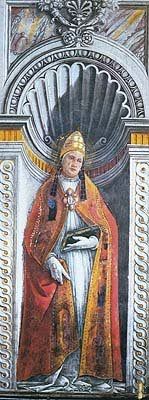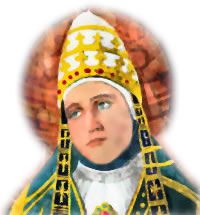Today, October 26, we celebrate the feast day of Pope Saint Evaristus (died 107), fourth successor of Saint Peter. While little is known about this fifth pope, we do know that Saint Evaristus governed the Church for nine years, during which time he laid the groundwork for future Church policy. Saint Evaristus was profoundly committed to the expansion of vocations in the Church. The institution of cardinal priests is ascribed to him, as he is the pope who first divided Rome into several titles or parishes, assigning a priest to each. He also appointed seven deacons to attend the bishop and conferred holy orders three times in the month of December which was quite unusual, given that these ceremonies were generally reserved for seasons of fasting and prayer.
Saint Evaristus lived in the second century, born into a Jewish family in Bethlehem. He is often depicted in art accompanied by a crib, reflecting his close ties to Christ, due to the place of his birth. Saint Evaristus’ parents immigrated to Greece while he was very young, and the future pope was brought up in the Jewish faith. Pious, knowledgeable, and virtuous, Evaristus received the best education of the time.
As he grew, he was more and more drawn to Christianity, and eventually he became a priest, traveling to Rome, and engaging in ministry there despite the growing threat and persecution of Christians. He was much admired for his devotion to the Lord, service to others, and commitment to the teachings of Christ. So loved was he that when Pope Anancletus (who had elevated him to bishop) was martyred, Saint Evaristus was selected to replace him. For his part, Evaristus proclaimed his belief that he was unworthy to take the throne of Peter, but the Lord saw to his ascension.
Pope Saint Evaristus led the Church for approximately eight years, during which time he organized the Roman See, instructed and encouraged the clergy, and prepared the faithful for the persecution that was imminent. He wrote several letters, each reinforcing the teachings of the Church. In his first epistle, addressed to the bishops of Africa, Evaristus decreed that seven deacons were to monitor a bishop’s preaching, to ensure that he did not lapse from the true teachings. Evaristus did not wish to see undue accusations aimed at his bishops, yet reserved solely to the See of Rome the power to terminate any bishop as a result of this indiscretion. His second epistle drew a comparison between the lasting bond of husband and wife and that of a bishop and his diocese.
During the leadership of Pope Saint Evaristus, the clergy were solidified and the congregations of believers grew at an astounding rate—largely due to his love and zeal for the truth of Christ. However, as were most popes at that time of Church formation, Evaristus was eventually arrested during the reign of Emperor Domitian, and sentenced to death for being a Christian. As he was taken to prison, his jailers were amazed to see the joy on his face, as he thought himself privileged to have been found worthy to suffer and die for Jesus. He was martyred by decapitation, and his remains were buried in the Vatican near the tomb of Saint Peter.
While little is known about the life of our fifth pope, we can feel certain of his commitment to, and love of, the Lord. Pope Saint Evaristus inherited a difficult task—to assume the leadership of a Church beset by persecution and suffering. Rather than turning outward, this great leader looked within the Church, strengthening the roles of bishops and clergy, preparing the faithful to survive and thrive during their suffering, as Jesus did. His simple faith, love, and courage helped prepare the Church to weather the great storm!
Dear Lord, you gave your servant, Pope Evaristus, the gifts of wisdom and humility to guide your Church on earth. By his loyalty in shepherding the flock, may he continue to guide those on earth who seek his intercession. Amen.
Day 299 of 365
Prayer Intentions: Wisdom, humility, loyalty to the truth of Christ.
Requested Intentions: Complete recovery of son (P); Recovery of parish priest, health of mother, conversion of son (J); Successful employment, end to depression (J); Successful immigration and employment (S); Conversion of an unloving daughter (M); Recovery of husband, health of mother, economic freedom (R); Freedom from depression, restoration of family relationships (N); Restoration of a relationship (J); Healing of friends from cancer (J); Complete healing of a friend with pancreatic cancer (J); Recognition of God’s Will; Obedience in vocation (J); Successful employment (M&I); For a son who struggles (S); Conversion (P); For family, peace, and social justice (J); Son’s employment (K); Discernment of the Lord’s will (A); Mother’s full recovery from a stroke (K); Employment (P); For family’s prosperity and employment (M); For a husband’s addiction (F); Health in a relationship, literary representation (D); For a mother struggling with cancer (P); Employment and financial assistance (L); End to work troubles, return to health (R); For a husband’s recovery from alcoholism (M); Healing of a father battling cancer (S).
Why pray the Rosary every day for a year?
Each time the Blessed Virgin has appeared-- whether it be to Saint Bernadette Soubirous at Lourdes; to Lucia, Jacinta, and Francisco at Fatima; or to Mariette Beco at Banneux-- she has asserted the importance, saving grace, and power of praying the Holy Rosary on a daily basis. Based upon her words, the Rosary is penance and conversion for sinners, a pathway to peace, an end to war, and a powerful act of faith in Jesus Christ. Pope Paul VI presented the Rosary as a powerful means to reach Christ "not merely with Mary but indeed, insofar as this is possible to us, in the same way as Mary, who is certainly the one who thought about Him more than anyone else has ever done."
To show us how this is done, perhaps no one has been more eloquent than the great Cardinal Newman, who wrote: "The great power of the Rosary consists in the fact that it translates the Creed into Prayer. Of course, the Creed is already in a certain sense a prayer and a great act of homage towards God, but the Rosary brings us to meditate again on the great truth of His life and death, and brings this truth close to our hearts. Even Christians, although they know God, usually fear rather than love Him. The strength of the Rosary lies in the particular manner in which it considers these mysteries, since all our thinking about Christ is intertwined with the thought of His Mother, in the relations between Mother and Son; the Holy Family is presented to us, the home in which God lived His infinite love."
As Mary said at Fatima, "Jesus wants to use you to make Me known and loved. He wishes to establish the devotion to My Immaculate Heart throughout the world. I promise salvation to whoever embraces it; these souls will be dear to God, like flowers put by Me to adorn his throne."

Subscribe to:
Post Comments (Atom)












0 comments:
Post a Comment
Thanks for leaving a comment. If you wish to submit a prayer request, however, please do so above, using the "Contact" tab.